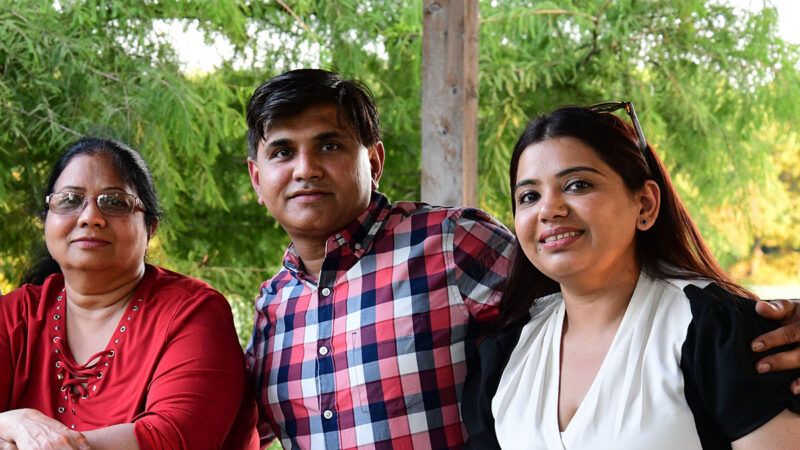Kansas Wants This Experienced Eyebrow Entrepreneur To Get 1,000 More Hours of Training
Jigisha Modi can't hire her own mother-in-law—who has decades of eyebrow-threading experience—because of Kansas' occupational licensing rules. Now she's suing.

Jigisha Modi and Jignesh Biscuitwala are a married couple who together run Miracle Eyebrows, an eyebrow threading business with locations in Olathe and Shawnee, Kansas. Struggling to find potential employees, they hoped to hire Jignesh's mother, Jyotsna Biscuitwala, to come work for the family business. But Kansas' occupational licensing regime has made doing so incredibly difficult.
Eyebrow threading is a simple hair removal technique that goes back thousands of years in parts of South Asia and the Middle East, where the skill is often passed down through families and friends. It uses a single loop of cotton thread to safely and gently remove unwanted hairs and, unlike waxing, doesn't involve heat or significant pain.
Jyotsna is the one who taught the couple how to thread, and she has almost 30 years of threading experience. In 1992, she opened a threading business in India and "performed thousands of threadings," according to a lawsuit filed in the District Court of Shawnee County, Kansas, by Modi and Jignesh and Jyotsna Biscuitwala.
After immigrating to the U.S. in 2004, Jyotsna tried to get the required license so she could continue to use her threading skills to make a living. But the licensing requirements were expensive, and there were no courses or exams offered in her native language.
Without a license, the couple cannot legally hire Jyotsna, despite her experience.
Kansas law dictates that a license is necessary to practice cosmetology, which includes "temporary hair removal from the face or any part of the body by use of the hands or mechanical or electrical appliances other than electric needles." Getting this license requires at least 1,000 hours of pricey cosmetology school, hundreds of hours of apprenticeship, and the completion of two examinations.
Now, Modi and Jignesh and Jyotsna Biscuitwala are teaming up with the Kansas Justice Institute to challenge that requirement.
"Of the 1,000 hours required to become a licensed esthetician, only 40 hours are devoted to an entire category of hair removal," notes their petition. "Assuming each hair removal topic was evenly taught, only 1.667 hours would be devoted to threading theory, and only 5.0 hours would be devoted to the practice of threading. Therefore, of the mandatory 1,000 hours, esthetician school spends 99.333% teaching non-threading-specific information."
This means threaders like Jyotsna who hope to become licensed are forced to do about 993 hours of unnecessary training just to practice a simple traditional hair removal technique that requires no skin-to-skin contact and does not reuse materials.
Kansas Justice Institute lawyer Samuel MacRoberts sees this as a clear violation of Kansas' unique "Life, Liberty, and Pursuit of Happiness Clause," which is modeled off of the Declaration of Independence. This clause of the Kansas Constitution states that "all men are possessed of equal and inalienable natural rights, among which are life, liberty, and the pursuit of happiness."
"In our view, [the Kansas constitution] protects the right to earn an honest living," MacRoberts tells Reason. "We are basically tracing the right to earn an honest living from the Magna Carta, through Thomas Jefferson, through the Declaration of Independence, through the Kansas founders."
By keeping Jyotsna from being able to help at her family's threading business, the state of Kansas is violating its constitution and unreasonably and unfairly restricting her right to pursue her own happiness and use her skills to help her family achieve prosperity, he argues.
In a similar case out of Texas (Patel v. Texas Department of Licensing & Regulation), the Texas Supreme Court ruled in 2015 that the state's requirement of 750 hours of training to thread professionally was unconstitutional and "so burdensome as to be oppressive in light of the governmental interest."
"The important thing is, Jigisha can't hire her own mother-in-law because of unreasonable laws and regulations," says MacRoberts. "It's completely unfair, and that's why we are fighting this threading regime in Kansas."
